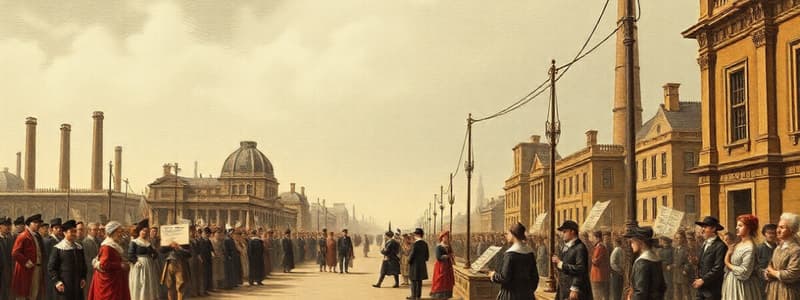Podcast
Questions and Answers
Which of the following scenarios best illustrates the application of John Locke's concept of natural rights during the Age of Revolutions?
Which of the following scenarios best illustrates the application of John Locke's concept of natural rights during the Age of Revolutions?
- The Meiji Restoration's implementation of state-sponsored industrialization and centralized control over key industries.
- The Haitian Revolution's focus on maintaining the existing social hierarchy while seeking economic reforms from France.
- Simón Bolívar's advocacy for the establishment of independent republics in South America, asserting the rights to life, liberty, and property. (correct)
- The French monarchy's decision to convene the Estates-General to address fiscal problems.
How did the Enclosure Movement in agriculture contribute to the onset of the Industrial Revolution in Europe?
How did the Enclosure Movement in agriculture contribute to the onset of the Industrial Revolution in Europe?
- By encouraging cooperative farming arrangements, it strengthened rural communities and reduced migration to urban centers.
- By decreasing the amount of land available for farming, leading to widespread famine and population decline.
- By promoting crop diversification and sustainable farming practices, it reduced the need for technological innovation.
- By consolidating land ownership, it displaced small farmers and created a labor surplus available for factory work. (correct)
Which statement explains a significant difference between the American and French Revolutions?
Which statement explains a significant difference between the American and French Revolutions?
- The American Revolution sought to overthrow a distant colonial power to establish a constitutional democracy, while the French Revolution aimed to overthrow the existing domestic social and political order. (correct)
- The American Revolution was primarily driven by economic grievances, while the French Revolution was mainly fueled by religious conflicts.
- The American Revolution led to a highly centralized government, while the French Revolution promoted regional autonomy.
- The American Revolution resulted in the immediate abolition of slavery, while the French focused on expanding colonial holdings.
What was the main purpose of the Berlin Conference of 1884-1885, and what impact did it have on the African continent?
What was the main purpose of the Berlin Conference of 1884-1885, and what impact did it have on the African continent?
How did the Opium Wars impact China's relationship with Western powers?
How did the Opium Wars impact China's relationship with Western powers?
Flashcards
Natural Rights
Natural Rights
Belief in inherent rights that cannot be taken away.
Social Contract
Social Contract
Agreement where people give up some freedom for government protection.
Haitian Revolution
Haitian Revolution
First successful slave revolt; led to an independent nation in 1804.
Industrial Revolution
Industrial Revolution
Signup and view all the flashcards
Capitalism
Capitalism
Signup and view all the flashcards
Study Notes
- Focus is on key events and trends from 1750-1900
The Enlightenment & Revolutions
- Enlightenment thinkers advocated for natural rights and the concept of a social contract
- Key Enlightenment figures include John Locke, Rousseau, Voltaire, and Montesquieu
- Enlightenment ideals influenced political revolutions
American Revolution (1776)
- Inspired by Enlightenment principles
- Resulted in the establishment of a constitutional democracy
French Revolution (1789-1799)
- The monarchy was overthrown
- Declaration of the Rights of Man was created
- Experienced the Reign of Terror
Haitian Revolution (1791-1804)
- First successful slave revolt in history
- Led by Toussaint Louverture
Latin American Revolutions (1810-1825)
- Inspired by previous revolutions
- Simón Bolívar was one of the key leaders
Industrialization & its Effects
- Several factors contributed to industrialization
- Access to coal, iron, and waterways were key resources
- Increased agricultural productivity due to the Enclosure Movement
- Availability of capital investment and labor supply
- Significant technological advancements, including the steam engine and factory system
Effects of Industrialization
- Rise of factories and urbanization
- Poor working conditions
- Social changes, including the growth of the middle class and increased participation of women in the workforce
- Socialism, Communism (Karl Marx), and labor unions formed in response to the effects of industrialization
Economic Systems & Global Trade
- Capitalism & Adam Smith advocated for Laissez-Faire and a free market
- Industrialized countries exploited non-industrialized regions for resources and markets
- Expansion of Opium Trade (China), Meiji Japan's modernization, and imperialism occurred for raw materials
Imperialism & Resistance
- Imperialism had multiple motivations
- Economic factors, such as the need for raw materials, played a significant role
- Political motivations included the desire for power and strategic advantage
- Social motivations included the concept of the "White Man’s Burden" and Social Darwinism
- Africa and Asia were heavily colonized
Colonization of Africa & Asia
- British in India established the Raj and experienced the Sepoy Rebellion
- Scramble for Africa was formalized by the Berlin Conference
- China was affected by the Opium Wars, which led to spheres of influence
Resistance Movements
- Zulu Resistance was led by Shaka Zulu
- Boxer Rebellion occurred in China
- Indian Revolt of 1857, also known as the Sepoy Mutiny, took place
Studying That Suits You
Use AI to generate personalized quizzes and flashcards to suit your learning preferences.
Description
Explore key events and trends from 1750-1900, including the Enlightenment, American, French, Haitian, and Latin American Revolutions. Understand the influence of Enlightenment thinkers and the causes and effects of industrialization. Key figures like John Locke, Rousseau, and Simón Bolívar are covered.




